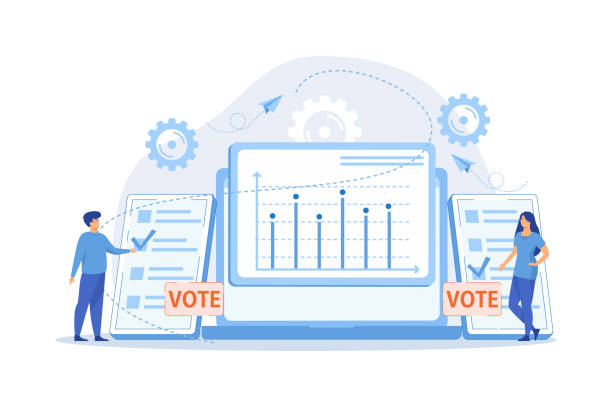A comprehensive guide on anonymous polling techniques and best practices

The Rise of Anonymous Polls
In the age of information, where data is gold, the anonymous poll has emerged as a beacon of privacy and honesty. It’s not just a contemporary fad; its roots are deeply ingrained in the history of democratic systems and free expression. As technology advanced, especially with the rise of the internet, anonymous polls carved a niche for themselves, becoming an essential tool for obtaining unbiased feedback.
Evolution in the Digital Age
Traditional polling methods, though effective, were limited by geography and respondent availability. The digital age brought with it the promise of reaching out to a broader audience without boundaries. Platforms sprang up, offering the luxury of anonymity, thereby enhancing the quality of feedback.
The Need for Privacy and Anonymity
In a world where every click is monitored, people yearn for spaces where they can express without being judged or identified. The beauty of an anonymous poll lies in its promise to protect a user’s identity, encouraging honesty and transparency.
Understanding Anonymous Polls
A dip into the basics is always enlightening. Let’s demystify what anonymous polls truly entail.
What is an anonymous poll?
Simply put, an anonymous poll is a feedback mechanism where respondents can provide input without revealing their identities. It’s like casting a vote without anyone knowing who you are.
Differences between regular polls and anonymous polls
While both types aim to gather feedback, regular polls might capture respondent details, whereas anonymous polls guarantee complete anonymity, ensuring that feedback remains uninfluenced by external pressures.
Advantages of Using Anonymous Polls
When wielded correctly, the power of anonymous polls is unmatched.
Enhancing Honest Feedback
Fear of retribution often restricts individuals. Anonymous polls remove this barrier, encouraging respondents to be brutally honest.
Fostering a Safe Environment for Opinions
These polls offer a sanctuary where opinions, however unpopular, can be expressed without fear.
Gaining Insights without the Bias
By its very nature, anonymity reduces the risk of bias, giving a clearer picture of the ground reality.
Challenges with Anonymous Polls
However, like every coin has two sides, anonymous polls come with their set of challenges.
Potential Misuse and Abuse
Anonymity can be a double-edged sword. While it encourages honesty, it can also be a breeding ground for trolls and malicious content.
Ensuring True Anonymity
The irony is that in a bid to ensure anonymity, some platforms might inadvertently leak data. This jeopardizes the very essence of anonymous polling.
Creating an Effective Anonymous Poll
Crafting a poll that draws insightful responses requires more than just slapping together a few questions.
Steps to Design a Poll
Begin by defining the purpose. Draft clear, unbiased questions. Test the poll on a smaller group before launching it to a larger audience.
Choosing the Right Platform
Platforms like SurveyMonkey or Typeform offer varying degrees of anonymity. Choose one that aligns with your needs.
Setting Clear Objectives
Knowing what you want to achieve with the poll is half the battle won. Set objectives that guide respondents and give clarity.
Interpreting Results from Anonymous Polls
The real task begins once responses start pouring in.
Reading Between the Lines
Anonymous feedback may require a bit of interpretation. Look for patterns, recurrent themes, or standout points.
Overcoming Potential Biases
Even anonymous polls can have biases. It’s essential to be aware and adjust interpretations accordingly.
Real-world Applications
Anonymous polls aren’t just academic concepts; they have tangible applications across sectors.
Anonymous Polls in Businesses
Companies use them to gauge employee satisfaction, gather feedback on policies, or even measure the success of training programs.
Use in Education and Institutions
Institutions employ anonymous polls to gather student feedback on courses, teaching methods, or even campus facilities.
Legal and Ethical Implications
Treading the line of legality and ethics is paramount when dealing with anonymous polls.
Ensuring User Privacy
Even if names aren’t taken, other identifiable data should be protected. An ethical responsibility lies with poll creators.
Responsibilities of Poll Creators
Beyond just collecting data, poll creators should ensure its secure storage, mindful interpretation, and ethical usage.
Anonymous Poll vs. Confidential Poll
A common misconception is that these two are one and the same. Let’s clear the air.
Key Differences
While both protect respondent identity to some extent, confidential polls might store respondent data, whereas anonymous polls do not.
When to Use Which
Choose based on your objective. If the focus is on protecting respondent identity completely, go anonymous.
Future of Anonymous Polling
The road ahead is paved with innovations. With advancements in AI and machine learning, anonymous polling is poised to become smarter and even more integral.
Predictions for the Next Decade
Integration with virtual reality, real-time sentiment analysis, and more sophisticated data interpretation tools are on the horizon.
Merging with Other Technological Trends
As tech worlds converge, expect to see anonymous polls integrating with other trends like augmented reality or even IoT.
Anonymous Poll: A Deep Dive
Diving deep into the mechanics, it’s evident that the essence of an anonymous poll is its promise of privacy and unbiased feedback. While the technology facilitates, the responsibility of ensuring its effective and ethical use falls upon us. As with any tool, its power lies in how it’s wielded.

FAQs on Anonymous Poll
- How does an anonymous poll ensure user anonymity?
Platforms use encryption and other security measures to ensure data remains anonymous and protected.
- Is there any foolproof way to ensure a poll remains anonymous?
While technologies are advanced, absolute assurance is challenging. However, choosing reputable platforms reduces risks.
- Why are businesses leaning towards anonymous polls?
Companies value genuine feedback, which anonymous polls promise by removing the fear of backlash.
- What are the downsides of using anonymous polls?
Potential misuse, spread of misinformation, and challenges in ensuring true anonymity are some concerns.
- How are anonymous polls different from confidential polls?
Anonymous polls do not collect or store any identifiable data, while confidential polls might.
- Can anonymous polls be integrated into other tech platforms?
Absolutely! With APIs and integration tools, polls can be incorporated into websites, apps, and other platforms.
Conclusion
Anonymous polls, with their promise of genuine feedback and protection of user identity, have carved a special place in the digital landscape. However, as with any tool, their success lies in ethical and effective usage. As we stride forward, harnessing the power of these polls, mindful and informed use will be the key.
